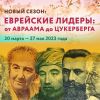Last week, Booknik read Mr. Pratchett, and tested food, prepared to answer his readers’ questions, and spoke with Dora and Velvel from the Coen Brothers’ film, learned who Raziel was, and journeyed through Ukrainian and Moldovan towns, remembered Yakov Tubin, and watched a movie about ultraorthodox drug traffickers, learned some I-words, and ate shawarma and a sandwich. Oh, and he saw a steam engine. He also learned how to speak with children about death, and how to live his life when his children are sent away to a summerhouse (and it is complicated on both counts). His junior, in the meantime, tried to understand how to be educated in a cheder, baked a casserole, listened to the Booknik Radio, read some comic strips by Tove Jansson, and went to science museums.
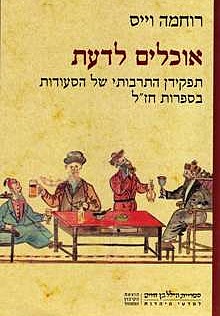
Meal Tests. The Meal in the World of the Sages, by Ruhama Weiss
A Jewish meal in Talmudic times was not only satisfaction of bodily demands but also a test. A Jew was thus tried for his wish to become a part of Jewish social elite. Politeness, table manners, and eaters’ prayers were signs to separate those who behave from those who don’t. In her monograph, Ruhama Weiss makes it possible to look at Talmudic stories that describe meals in a new light. Some inadequate, to modern standards, behavior of Jewish sages turns out to be highly sensible, and not rude or absurd at all. Booknik reviewers Marina Karpova and Yevgeny Levin read and wonder.
If Wet, in the Library
Nation, by Terry Pratchett
The genre of Terry Pratchett is traditionally defined as “comic fantasy,’’ if you don’t count the fact that all worlds that he creates are more real than the one we have to live in. There are different worlds in Pratchett’s universes, and they all have some fault or other. However, all of them are governed by some ultimate justice principle. Any Pratchett’s idiot is far more sensible than our world’s idiots are. Any of his characters is more alive and human, even if he is a werewolf, troll, or dwarf. Especially if he is a troll or werewolf. Pratchett’s sparkling sense of humor is inimitable. Anyone can make puns, mock or add irony to anything he says, and nevertheless hardly anyone else could do all of the above with such immense love. The new book by Mr. Pratchett is, at the same time, very uncharacteristic of him, and very telling. Booknik reviewer Ivan Pervertov reads it, and thinks of simplicity and beauty.
…and many other surprising surpluses in the Books & Reviews section.
Booknik’s Interactive Interview
Soon, Booknik turns 4 years old. This is a rare occasion for our readers to ask our editorial board in toto or each editor alone something. Moreover, at our next editorial session, we’re going to raise the Booknik spirit by means of turning our big oval table, and you have a chance to have your questions answered by him. Everything you tried to ask in comments to our stories, and we neglected to answer due to our faulty memory or absent-mindedness, everything you asked at our Booknik Shows, and we didn’t hear above the fanfares and timpani of our musicians, everything you only wanted to ask but were afraid—all of these and more you may ask now. This is the place and the time to do so, until July 10.
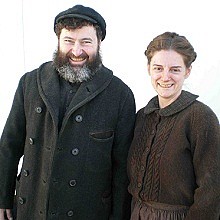
Dora and Velvel lived in a Jewish village in the early 20th century. Their story serves as an opening to the Coen Brothers’ film A Serious Man. It is acted in Yiddish, the language of 11 million Jews at that time, now spoken only by ultraorthodox ghettos’ inhabitants, rare Yiddish intellectual scholars, and some klezmer musicians, after massive waves of migration, assimilation, and the Holocaust. It wasn’t an easy task to find Yiddish-speaking actors to fit those shtetl-dwellers’ roles but Coen Brothers ultimately succeeded. In real life, Yelena Shmulenson and Allen Lewis Rickman have been married for 10 years, although they’ve never played man and wife in movies. Booknik reporter Yelena Polyakovskaya speaks with them about Jewish theater in the present-day America, difficulties of the English-to-Yiddish translation, and, of course, working with Ethan and Joel Coens.
Who Is Raziel? The Angel in Jewish Mysticism, Literature, and Real Life
Raziel is also known as Raziil, Sarakvil, Suriel, and Galizur, the bringer of The Book of Secrets, and the “stupidest angel” in Christopher Moore’s novels. He descends to Earth to pose as a firefighter, paramedic, or student. His name was given to a man who became a legend in a real war. Raziel in the ancient Jewish magic, Raziel from a book and David Raziel the real hero are now seen in the report and two reviews by our Israeli contributor Ariel Bulstein.
…and many other angelic appearances in the Articles & Interviews section.
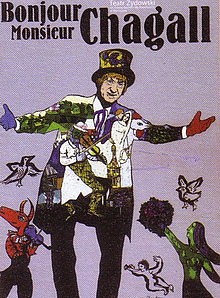
Booknik’s French reporter Kira Sapgir attended great many events, exhibitions, and discussions in Paris, dedicated to the Year of Russia in France, and the Day of Jewish Culture there. The sudden and unpredictable character of all those events makes one think that the Creator had a surrealistic trip. How can one otherwise explain this medley of a discussion on the Bokhara Jews’ origins, a theater show on Marc Chagall, a ringing balalaika playing Bublichki, and an academic lecture on the burning issue if Chaim Soutine’s art was kosher?
Amazing Citizens of T.
Taras Shevchenko went down on the town of Tarashcha like a steamroller, without seeing anything in this place, but “a rotting swamp.” However, our Ukrainian reporter Lesya Bobrova wonders, the citizens erected his monument anyway. And very strange people they are. They restored the local Jewish cemetery for nothing, and the local Baby Yar, although there are only about a dozen retired elderly Jews among them. It is a matter of memory, she thinks, not of Jewishness.
…and many other historical reconstructions in the Events & Reports section.

Holy Rollers, directed by Kevin Asch
The film by Kevin Asch is based on real events. It says so at the film poster, in black and white: in 1998, the group of ultraorthodox Jews brought over a million ecstasy pills into the United States. However, the director does not name any names, he prefers to speak only in terms of the general “idea,” of the ultraorthodox Jews and drug trafficking. The film was conceived as a drama but turned out to serve as an illustration to some Woody-Allenesque maxim about people in New York who always choose the way of the least resistance. With some local color added. Our U.S. reporter Pavel Push watches the film about ultraorthodox drug traffickers.
Bessarabian Notes for a Man of My Dreams
“Who I am with here, you ask? Oh, we have a glorious team, including some stars of ethnography, some ethnography stars wannabes, and some religion students. This is whom I am with. A very merry team.” Our far-flung reporter Natasha Galkina goes to Moldova, and writes letters about ethnography, people, and love.
Shawarma, Gyros, Tarna, AKA Fast Food
When our intrepid contributor Keren Pevzner traveled across Russia, she always asked her native companions to introduce her to some authentic Russian cuisine. At one point, she found herself in the Mother Russia heartland, Pereyaslavl-Zalessky. She couldn’t tear her eyes off the landscapes, with green and white birches, she couldn’t smell enough of the aroma of earth and grass. It was fantastic! And those road signs made her ecstatic, with names like Yaroslavl, and Sergiyev Posad. She almost wished to see some accordion-playing bears. No such luck though, and the traditional Russian cuisine was represented by pancakes, and cottage-cheese patties. This is why she wanted some real shawarma when she returned to Israel.
…and many other native wonders in the Columns & Columns section.

He treated theater as a jealous lover, defending it furiously against all kinds of dullness, and lack of talent. He could write about a very distinguished prima, “An actress of exclusively rare tearfulness.” He could say about a tragedian, that in one of his roles he wonderfully gnaws on the curtains. Tubin was an authority, and if “the judgment of Solomonych” was passed, one had his reputation sealed. He never made any genre allowances, saying that it didn’t matter if it was a drama, a comic opera, or a puppet show, performed in a province or in a metropolis. If we can’t astonish and conquer spectators with our art, we shouldn’t do it at all. Miriam Gurova remembers her teacher Yakov Tubin, the theater critic, pedagogue, and theater historian.
…and many other high theatrics in the Stories & Essays section.
Hokku Schmokku
Now we have drawn the line in the contest submissions but this is not the end, our beautiful friends. The voting on your hokkus remains open until July 14. Vote for the ones you like best, for the winners of the users’ voting, and the Booknik editors’ choices will be awarded with nice prizes, including wonderful books (their wonderfulness guaranteed), and T-shirts with winning hokkus. The best oeuvres will also be read aloud at the Booknik Birthday Party in the Moscow Squat Club on July 18.
…and many other haiku-schmaikus in the Contests & Quizzes section.

As the midnight drew nearer, a real steam engine rolled onto the stage. It was made of real iron, with rivets and rails glistening in the spotlights, its wheels and pistons banged in rhythm, its whistles let out steam a-plenty, shrill as clarinets, and its cars’ springs whined fiddle-like. The whole room was filled with steam, and the childhood dreams of a toy railroad. That beauty of an engine made a five-minute stop at the junction, and then it was off to fit the schedule, with a farewell whistle.
The History of Israel in Hebrew 16: We’ll Screw Them Forcefully, Quickly, and Elegantly
By the end of War and Peace, there is an episode when Kutuzov uses some devil-may-care expletive in front of the ranks of his triumphant soldiers, something along the lines of “We’ve made them.” His soldiers hum their approval back. A century and a half later, the brigadier Haim Bar-Lev used the old method again, a salty word to boost his troops’ morale. It worked also on the Israel’s civilian population. Our talking head Arkan Kariv goes on with the history of Israel.
The History of Israel in Hebrew 17: The New Middle East
The peace-making euphoria that started in 1993 in Oslo took not only the Israeli foreign minister Shimon Peres but the Palestinians as well. Everyone suddenly decided that the war was over, and the peace was nigh. All grudges were forgotten, and from that time on, everything’s gonna be alright— Fat chance. Something went very wrong. The dream of the brotherly love in the Middle East, of not war but trade, was short-lived indeed. It lasted only four years. Arkan Kariv continues with his history of Israel in quotable quotes.
Hebrarium, the Lexicon of Jewish Whatnots: I3
How many embassies are there in Jerusalem? When are the streets of Israeli cities deserted? Who got carried away by the “magic carpet”? Watch Kirill Chichayev’s I-Hebrarium and get smarter: Jerusalem, Yemeni Jews, and Yom-Kipur.
Don’t Grudge the Brew 49: Sabah is the Sandwich’s Enfant Terrible
Why is this sandwich terrible, of all things? It doesn’t even have meat inside! There are only three layers of bread, with vegetables, eggs, and tahini in-between, in a harmonious conjunction. What can be wrong here? The thing is the amba sauce. Some people consider a couple of this yellow sauce’s drops a fly in their ointment. Some other people are not easily thrown by its specific aroma, and acid color. Booknik’s brilliant chef Roman Gershuni shares his bits of wisdom on this food.
…and many other tasty morsels in the Video Blog section.
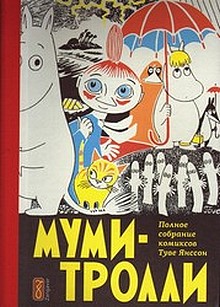
Moomin: The Complete Tove Jansson Comic Strip, Volume One, by Tove Jansson
For a score of years, the Evening News regularly published the original Moomin comic strips drawn by Tove Jansson herself. Later, she translated them into English. Every strip is of a short novel’s length, and there are five of those volumes. Mumintroll and his friends are celebrating their 65th anniversary this year, and in Moscow, the first of those volumes is now published, with those Evening News picture stories. Four volumes more are expected soon, so we have something to hope for. The first installment is read by Xenia Moldavskaya.
Johnny Mnemonic
It’s wonderful to have some summer, isn’t it? Even if you adore school, you have to have some rest from it. Going to schools has never been easy. Now, Nellie Shulman will tell you about the kind of school your grandmothers and grandfathers may have gone to. They didn’t have physics or mathematics lessons there, they didn’t even have any geometry, but still they had to toil morning to night on mastering their knowledge of things.
Casserole or Tomatoes? Casserole!
The Three Weeks, from the Seventeenth of Tammuz through the mourning day of Tisha B'Av (the Ninth Day of Av), are called Bein ha-Metzarim, or “Between the Straits.” These two are the days of terrible tragedies. On 17 Tammuz, Roman soldiers who had been besieging Jerusalem for a long time, broke through the walls, and took the city. On 9 Av, both Jerusalem Temples were destroyed. Jewish sages set up some special mourning laws that come into effect on the first day of Bein ha-Metzarim. One of the bans is on eating meat from 1 to 10 Av. But what are the growing organisms to eat at that time, tomatoes? The casserole is much better, Yelizaveta Guller thinks.
Booknik Radio: A Story of a Poor Man and a Wonder Bird
This new Kadya Molodovsky’s poem is about a poor man, a wonder bird, a vixen and her fox-cub, a bear and his bear-cub, and their attempt to exchange that led to a common wonder, and it is read by Pavel Lion and Yana Ovrutskaya.

Not a long time ago, we told you about the Jerusalem Science Museum. In fact, museums like this can be found in any country, in big cities like Moscow, Paris, Helsinki, or London. Booknik Jr. visited some of them, and now Iraida Stepnova tells what she saw there.
How to Speak with Children about Death: Basic Principles
Is it worth the effort to tell a five-year-old about the end of one’s life? Are we ready to answer not-so-childish questions of our children? The family psychologist Yekaterina Burmistrova suggests we should tell the truth, however parents should not start this conversation without a good reason. The enlightenment doesn’t work this way. Don’t try to pose as an all-knowing entity in front of your child, and try to answer only those questions that your child is really worried about.
Dedicated to the Childfree. The Notes of a Crazed Parent
“I nurtured that plan for several months. I took everything into account, including my job schedule, the grandmother’s timetable, the babysitter’s overtime, the husband’s solvency, the Betelgeuse’s angular speed ratio. The son goes to the sea with his granny, the daughter goes to the summerhouse with her nanny. I had some grandiose plans for those five days. I’m going to the movies at night. I’m going to smoke, and flick the ashes right on the nursery’s floor. I’m going to drink champagne straight from the bottle, and holler daring songs right under someone’s windows. I’m going to a beauty salon, finally. And I’ll stroll along the boulevards to the wee small hours of the morning. Some other small things, too. Drink myself stupid. Sleep until one in the afternoon, have breakfast at eight in the morning on some cafes’ trendy terraces, and try long flowery frocks on.” Is it worth mentioning that the best laid plans of mice and men, etc.? Booknik Jr’s contributing editor Alexandra Dovlatova-Mechik reminisces.
…and many other summer treats at Booknik Jr., also known as Family Booknik, our own web site for kids and their parents.
Run for cover, I'm comin' in! Booknik and Family Booknik are supported by the AVI CHAI Foundation.









